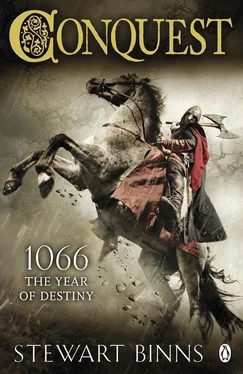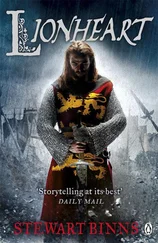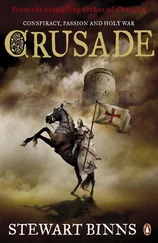They shouted their response in unison. ‘But you’re not coming with us!’
‘I’m sorry, but I must do this; for you, for your mother and for all good people everywhere.’
Maria and Ingigerd took the girls away to try to comfort them.
Hereward turned to the three men. ‘When the time comes, get them away. Don’t hesitate, and don’t look back; think only of them and your own children.’
Einar spoke for the three of them. ‘Nobody else has to die to prove the justice of our cause; it is undeniable. This damned crusade must have driven you insane if you can even think about letting the girls go while you remain here.’
His loyal friends looked at Hereward, each knowing in his own heart that Hereward’s mind was made up and that nothing would deflect him from his course of action.
Over the next few weeks, and as Easter of 1071 approached, something remarkable began to happen on the Isle of Ely.
First, entirely alone in the middle of a bleak, cold afternoon and with no personal belongings to speak of, a man appeared on the causeway who could easily have been the father of most of the defenders and the grandfather of many. He had no military experience, but carried a battle-axe that had belonged to his father, a former housecarl with the old Danish King, Harold Harefoot. He said he had heard the call to join the Brotherhood and had walked from Essex to take the Oath. Two brothers from Mercia came three days later. Next came a group eight fearsome-looking men from Richmond and the valley of the Swale, who had escaped from William’s cull of the North. They had heard that Hereward and his men had rescued Edgar the Atheling from his plight in Swaledale and felt it was their duty to join his cause.
At first it was a trickle of men, then it became a constant flow and by May it was a deluge rushing to join the Brotherhood. They came with and without weapons; some came on horseback, but many walked; some brought money, but most came with only what they wore or carried. The majority were trained soldiers, a few had land and wealth and an important number were artisans: carpenters, blacksmiths, chandlers and shipwrights. As each man took the Oath, his name was added to the Roll of Honour of the Brotherhood.
In addition to the survivors of the original contingent that Hereward had met on the River Ribble almost two years earlier – men like Gohor, Brohor the Brave and Wulfric the White – were added the names of new followers: Leofric the Black, Alveriz, the son of a mason from Spain, Azecier, a good friend of Alveriz, Matelgar, Alsinus, Wulric, Ailward the White, and Hugo, a Norman priest born in Rouen but with a parish near Winchester.
Soon there were 2,500 members of the Brotherhood on the Isle of Ely. If that were not remarkable enough, early one morning, emerging through the mist of the distant horizon, an even more unlikely group of men appeared. Hereward had been woken before dawn to be told that a large column of men was approaching from the west. At first, the scouts assumed it was a contingent of Normans, but then realized that they were English.
As they came into view across Ely’s causeway, Hereward recognized at once that the two men at the head of the column were England’s most senior surviving nobles, Edwin and Morcar, the Earls of Mercia and Northumbria.
Accompanying them was a substantial phalanx of housecarls and several senior members of England’s gentry, including landowners, clerics and thegns. They included Thorkill of Harringworth, a wealthy thegn from the East Midlands; Siward of Maldon, a rich merchant who was a major benefactor of Ely Abbey; Ordgar, Sheriff of Ramsey Abbey; Godric of Corby; Tostig of Davenesse; and Acore ‘the Hard’ of Lincoln. The last man to cross the causeway was Siward Bjorn, the only English magnate from the attack on York not to have submitted to William. True to the promise he had made to the Atheling in the Swale, he brought yet more men – over 150, a contingent he had been recruiting ever since he left Edgar over a year earlier.
Siward also brought news from the Atheling. The Prince was effusive in his praise for the Brotherhood, but asked to be excused from its stand at Ely. He was in Europe encouraging opposition to William and spending time with Philip of France, trying to persuade him of the threat posed by William to all men of decency and honour. Also, as he still regarded himself as the rightful heir and had ambitions to claim the crown for himself, he could not acknowledge William as King, even though he understood Hereward’s new position and admired the principles it represented. He sent the Brotherhood his full support and looked forward to the day when it would form his honour guard at his coronation at Westminster.
Siward was accompanied by a notable companion, Aethelwine, Bishop of Durham, who was to have crowned Edgar as King at York. Aethelwine was not originally a supporter of the rising, but the actions of William in the North had appalled and frightened him. He had been initially intimidated by the King’s ruthlessness, but when he heard of the Brotherhood at Ely, he found new heart and resolved to join him.
Edwin and Morcar, being of Danish descent, had found it difficult to accept the Cerdician domination of England. Both would have preferred a separate kingdom in the North and had been reluctant members of a federal England. However, after their ignominious defeat at Gate Fulford at the hands of Hardrada, their ambitions had been compromised. In defence of their absence at Senlac Ridge, they argued that it would have been impossible for them to get there in time. They felt it would have been much wiser for Harold to have waited, built a bigger army and then asked for their help, which they said they would have readily given.
Nevertheless, they admitted that they had not rushed to join his cause, something they deeply regretted. Their submission to William was another act that now filled them with remorse. Having, at his insistence, been at court with him and seen and heard what he was doing to England, their distaste for him had grown immeasurably, as had their shame at their own capitulation.
After their exhaustive and emotional account, they both stood and made a formal address to all present.
Earl Edwin spoke first. ‘For anything we have done or not done that has put our homeland in jeopardy, or added to its pain, we beg forgiveness.’
Earl Morcar continued. ‘We join the Brotherhood of St Etheldreda willingly and pledge our support wholeheartedly.’
They both raised their drinking horns. ‘To the Brotherhood!’
Their toast was immediately echoed by the assembly. ‘To the Brotherhood!’
It took a week and a half for all the new arrivals to be added to the Roll of Honour. When it was done, the Brotherhood had well over 3,000 members.
They all knew that there was little or no chance of inflicting any kind of significant military defeat on King William. Even so, they had chosen to stand on principle. Although 3,000 men was not an army strong enough to defeat the King, it was more than sufficient to make a din so loud it would be heard the length and breadth of the land and across Europe. At long last, the spirit of England, those proud traditions of Saxon, Celt and Dane, had emerged from the humiliation of defeat. William was attempting to make a people cower by butchering anyone who dared utter a sound in opposition. Now, a few good men were speaking out, despite the price they knew they would eventually have to pay.
When the warmer days arrived, Hereward ordered that the causeway, Ely’s lifeline, be destroyed. Ely would, like England itself, become an island again.
Once more, as he had in 1066, William would confront a military challenge across an expanse of water.
Читать дальше












